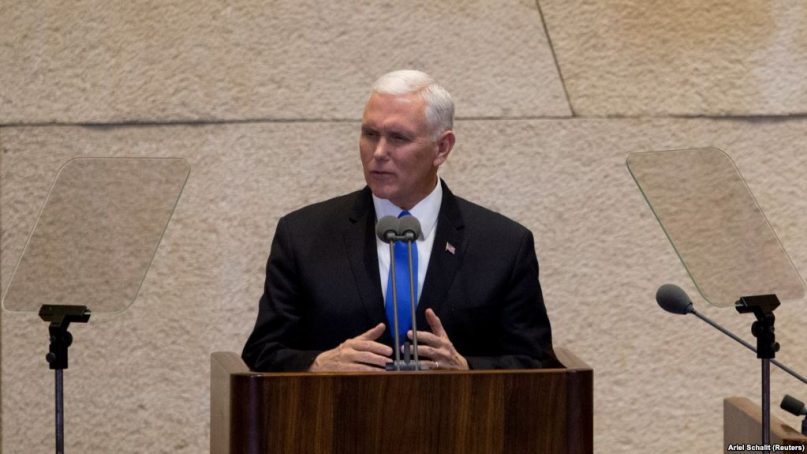I’m going to say something that I’ve never said before.
Mike Pence was right.
Vice President Mike Pence spoke at the Knesset in Jerusalem, and he spoke well. Despite the cynicism and suspicion that many Jews have of Christian Zionism (and, on some points, I count myself among the critics), Pence uttered some fundamental truths – truths that most American Jews would have to struggle to refute.
To wit:
The people of the United States have always held a special affection and admiration for the People of the Book. In the story of the Jews, we’ve always seen the story of America. It is the story of Exodus, a journey from persecution to freedom, a story that shows the power of faith and the promise of hope.
Pence was absolutely right. Look at American history. As Shalom Goldman has written, there has been a long standing relationship between the United States, and the story of the Jews.
The Pilgrims believed themselves to be like the ancient Israelites.
- The English monarchy was like Pharaoh.
- The Atlantic Ocean was like the Red Sea (which the Israelites cross, in this week’s Torah portion).
- New England was like the land of Israel; the mythological American “city on a hill” was intended to be nothing less than an evocation of Jerusalem.
There were losers in this drama, however. If the English settlers were the Israelites, someone had to play the role of the displaced, conquered Canaanites. That would be the American Indians – with disastrous, historically tragic results.
Therefore, let us be cautious and humble in evoking America as “the new Israel.” Yes, there is grandeur in that definition. There is also a kind of national hubris that can easily migrate into arrogance. Arrogance, in this narrative, always has victims.
And, more:
The US is proud to stand with Israel and her people, as allies and cherished friends. And so we will pray for the peace of Jerusalem, that those who love you be secure, that there be peace within your walls and security in your citadels. And we will work and strive for that brighter future, so everyone who calls this ancient land home shall sit under their vine and fig tree, and none shall make them afraid.
Mike Pence knows his Hebrew Bible. He began by citing Psalms (“pray for the peace of Jerusalem”), and then walked over into the prophet Micah (“…under their vine and fig tree.”)
Pence was hardly the first American political leader to use that prophetic quote.
George Washington had a particular affection for it. He referred to it in writing more than fifty times – first, as his hope for the future contentment of the soldiers who had fought in the Revolution, and second, as his own hope for a comfortable life at his beloved Mount Vernon.
The United States shares a biblical legacy with the state of Israel. For if you can’t quote Jewish texts in the Knesset, where can you quote them?
And, more:
As I stand in Abraham’s Promised Land, I believe that all who cherish freedom and seek a brighter future should cast their eyes here and marvel at what they behold…How unlikely is Israel’s birth; how more unlikely is her survival.
Consider the words of the late Canadian poet, A.M. Klein (quoted by my friend, Gil Troy, in his upcoming The Zionist Ideas):
Twigs and branches that had been dry and sapless for generations, for millennia, now budded, blossomed—and with new flowers. It was as if I was spectator to the healing of torn flesh, or heard a broken bone come together, set and grow again. . . .Little David had slain Goliath. The miracle had again been repeated; against great odds, the little struggling state had withstood the onslaught of combined might. . . .
Back to Mike Pence.
Tomorrow, when I stand with my wife Karen at Yad Vashem to honor the six million Jewish martyrs of the Holocaust, we will marvel at the faith and resilience of your people, who just three years after walking in the shadow of death, rose up from the ashes to resurrect yourselves, to reclaim a Jewish future and rebuild the Jewish State.
Pence was right. One interpretation of the meaning of the state of Israel, though far from being the only interpretation, is that it represents the resurrection of the Jewish people out of the ashes of the Shoah. Israel represents the ability of the Jewish people to once again control its own destiny.
Nothing expresses that sense of resurrection more than the Hebrew language. Whenever I go to services in Jerusalem, I inevitably find myself sitting close to the window. With one ear, I hear the chanting of the ancient liturgical Hebrew. With my other ear, I hear the children in the playground, yelling at each other in modern Hebrew. It is a stereophonic encounter with modern Judaism.
Isn’t that what the prophet Zechariah was talking about?
Thus said the LORD of Hosts: There shall yet be old men and women in the squares of Jerusalem, each with staff in hand because of their great age. And the squares of the city shall be crowded with boys and girls playing in the squares.
Finally, Vice President Pence mentioned Israel’s upcoming seventieth anniversary, and in so doing, said the Shehecyanu prayer, that Jews recite at momentous occasions.
As anyone who has read my columns knows, I am not a fan of this administration.
But, let’s give credit where credit is due.
Mike Pence spoke well, and he spoke the truth, in Jerusalem.
Acknowledging that is also a mitzvah.
It is hakarat ha-tov, mentioning the good that people do.






